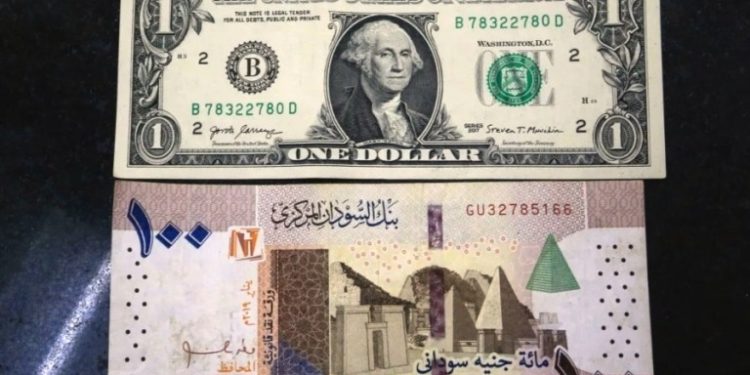By SUDAN TRIBUNE
February 20, 2024 (PORT SUDAN) – The Sudanese pound’s decline against foreign currencies continues, fueled by rising immigration and a weakening economy. Citizens’ demand for dollars, particularly for those seeking to leave the country due to the ongoing war and economic hardship, is placing further pressure on the currency.
While the Central Bureau of Statistics hasn’t published inflation data since February 2023, which stood at 63% then, the World Food Programme expects it to remain “above 300%.”
Traders in the parallel market quoted a dollar price of 1,300 pounds and a Saudi riyal exchange rate of 330 pounds. They attribute this rise to the increased demand for these currencies, especially from those aiming to immigrate.
Official bank rates remain lower, with the dollar hovering around 1,050 pounds and the riyal ranging from 282 pounds at the Bank of Khartoum to 308 pounds at the Omdurman National Bank.
Since the war between the army and Rapid Support Forces erupted on April 15, 2023, the pound has lost more than half its value. Back then, a dollar was worth approximately 560 pounds.
Economic analyst Haitham Fathi points to several factors driving the currency’s devaluation, including reduced exports, increased imports (both through companies and individuals), and a shift towards dollar transactions due to decreasing trust in the local currency.
“The constant value erosion prompts capital flight as people seek dollar havens,” Fathi noted. He also highlighted the surge in Sudanese citizens buying dollars, whether for travel or preserving savings, as contributing to the decline.
Other factors contributing to the pound’s weakness include the ongoing economic downturn, financial speculation, worsening economic conditions in Egypt (a key source of goods and services for Sudan), and the impact of undeclared international sanctions.
Fathi emphasized that the weak currency exacerbates inflation, disproportionately impacting lower-income groups who spend more on essentials like food.
“The pound’s turmoil reflects the extensive structural and general destruction of the economy,” he explained. “Productive sectors have been wrecked, revenue sources depleted, and the war and implicit sanctions hinder direct and indirect foreign investments.”
The World Bank predicts a 12% contraction of Sudan’s economy in 2023, while the International Monetary Fund expects this to worsen to 18.3% in 2024, all due to the prolonged conflict.
(ST)








Discussion about this post